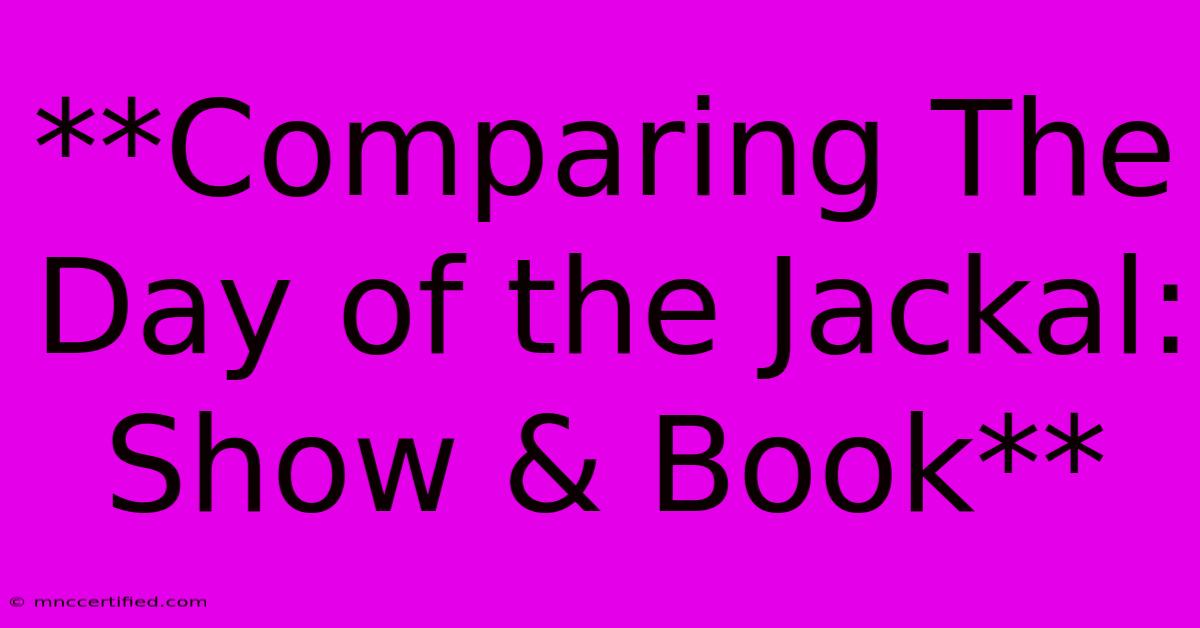**Comparing The Day Of The Jackal: Show & Book**

Table of Contents
Comparing The Day of the Jackal: Show & Book
Frederic Forsyth's 1971 thriller, The Day of the Jackal, is a gripping tale of a professional assassin hired to kill Charles de Gaulle, the President of France. The novel was adapted into a critically acclaimed film in 1973, starring Edward Fox as the titular Jackal and Michael Lonsdale as the French detective pursuing him. While both the book and the film retain the core elements of the story, there are significant differences in their approach and execution.
The Jackal: A Master of Detail vs. a Cinematic Character
The book delves deep into the meticulous planning and execution of the assassination attempt. It meticulously chronicles the Jackal's every move, from acquiring weapons and forged documents to observing de Gaulle's routines and selecting the perfect time and place for the attack. This detailed and analytical approach provides a chillingly realistic picture of the assassin's mindset and operational methods.
The film, however, streamlines the Jackal's story, focusing on the more dramatic and visually engaging aspects. While still maintaining the precision of the assassination plot, the film portrays the Jackal as a more enigmatic and silent figure. Edward Fox's stoic and almost emotionless performance enhances this portrayal, leaving much of the Jackal's inner workings to the audience's interpretation.
The Chase: A Tense Cat and Mouse Game vs. a Cinematic Pursuit
The book builds suspense through the slow-burning tension of the cat-and-mouse game between the Jackal and the French authorities. As the Jackal methodically prepares for his strike, the authorities race against time to identify him and prevent the assassination. Forsyth meticulously details the detective work, the frustrations, and the constant fear of failure.
The film, while maintaining the core narrative, utilizes cinematic techniques to heighten the sense of urgency and danger. The chase scenes, featuring a mix of car chases, close-quarters confrontations, and dramatic close-ups, create a more visceral and emotionally charged experience for the viewer.
The Ending: A Cold Resolution vs. a Dramatic Climax
The novel's ending is stark and unsentimental, reflecting the grim realities of political assassination. The Jackal's fate, though hinted at, is left ambiguous, leaving the reader with a lingering sense of unease.
The film, on the other hand, provides a more dramatic and conclusive ending. The final showdown between the Jackal and the authorities, though ultimately unsuccessful, offers a more satisfying resolution for the viewer, even if it deviates from the book's original conclusion.
The Overall Experience: A Thought-Provoking Read vs. a Thrilling Cinematic Journey
The Day of the Jackal is an excellent example of how a successful novel can be adapted for the screen while still retaining its core themes and impact. While the film provides a more visually engaging and emotionally charged experience, the book offers a deeper exploration of the intricacies of the assassination plot and the psychological complexities of the characters.
Both the book and the film excel at creating a sense of suspense and unease, leaving the audience with a lasting impression of the chilling realities of political violence. Whether you prefer the intricate detail of the novel or the dramatic tension of the film, The Day of the Jackal is a must-read/watch for fans of thrillers and historical fiction.

Thank you for visiting our website wich cover about **Comparing The Day Of The Jackal: Show & Book**. We hope the information provided has been useful to you. Feel free to contact us if you have any questions or need further assistance. See you next time and dont miss to bookmark.
Featured Posts
-
Powell Asserts Independence From Trump
Nov 08, 2024
-
Halle Bailey Criticizes Ddg Livestream
Nov 08, 2024
-
Outer Banks Season 4 Ending Character Name Fate
Nov 08, 2024
-
Gator Insurance Service Pinellas Park Fl
Nov 08, 2024
-
Aclu Ready To Challenge Trump Actions
Nov 08, 2024